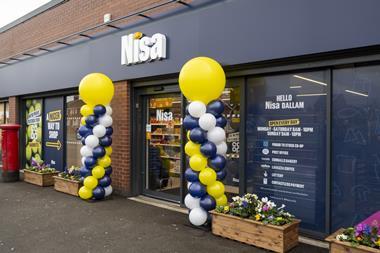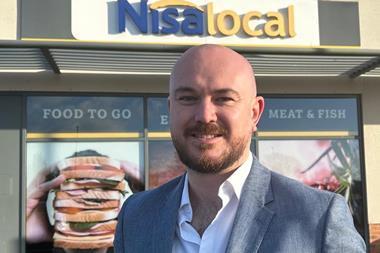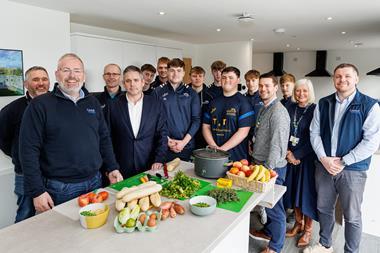Surprisingly for such a solid partnership, the pair had never met before their involvement in the Northern Independent Supermarkets Association. Their first meeting came about because Ramsden's family-owned food business in Grimsby was struggling to compete with the multiples on buying terms and he felt independent retailers should club together. "I'd had 10 good years but, by 1977, I could see that if I couldn't get my volumes together with other big independents I was going to have a problem," he says. United Biscuits' area manager tipped Ramsden off about Nisa, so he rang secretary Peter Garvin, managing director of Escafeld Grocers.
The two clicked straight away. Garvin recalls: "He said it's Dudley Ramsden of Ron Ramsdens and I've never heard of Nisa', and I replied don't worry. I've never heard of Ron Ramsdens', and we've kept on like that ever since." Their meeting at Bawtry, South Yorkshire, has entered into independent retail folklore. "We met at a quarter to twelve at the Crown Hotel boardroom and I got home at two o'clock the next morning." says Garvin. But, with a mischievous grin and to Garvin's embarrassment, Ramsden reveals for the first time what really happened that day. "The meeting actually ended about nine in the evening, but next door was a mixed sauna. Everything was above board remember, this was 25 years ago and everything was a lot more innocent but we went in and we couldn't believe it. There were all these couples in there and we were the only guys without a partner."
Nisa had been formed by a number of sizeable independent supermarket operators and Garvin had been appointed to run it. He says: "I had not been getting very far until that meeting then it took off."
Using a room at the Crown and with administration by Escafeld, the pair started a hectic schedule of 16 meetings of 20 minutes each a day, negotiating on overrider discounts with manufacturers. Meetings with potential retail recruits were fitted in around them. Ramsden says: "It was chicken and egg. We needed members to be able to get deals with suppliers but, equally, we needed some quick deals to show retailers there were potential improvements in terms." The balancing act worked. Starting with one day every two or three weeks, the schedule built up to one day a week, then two, then snowballed.
Negotiations first demonstrated how well the two partners complement each other. Ramsden describes Garvin as "a genuinely nice person" but admits: "I have a sort of killer instinct. I know I've got it and I'm pleased, but on many occasions Peter has just calmed me down." Garvin remembers one time when they were negotiating with a very big player. "The moment he and Dudley sat down there was tension and after half an hour the other guy said I've had enough' and headed for the door. I was the one putting an arm on his shoulder and I always got him back. And Dudley would be saying to me I'm not having him talk to me like that'. But we got the deal."
Next the partners decided they needed to develop a distribution arm. Ramsden explains: "The whole method of trading was changing. The major multiples had built their massive RDCs and moved from branch drop to central distribution, and we were convinced we had to do the same." Suppliers were getting rid of their sales forces and didn't want to deal direct with independents any more.
But Nisa didn't have any funds of its own running costs were divided between the members and there were no reserves. The solution was supplied by Ron Hasler, who was looking to build up a distribution company in Milton Keynes. Distribution of own label ambient products began and, Ramsden says: "Volume went through the roof. Members loved it because it was one wagon, one order, once a week." But when Nisa then wanted to distribute branded products it had outgrown Hasler and Bibby, which still handles ambient distribution, took over. A spin-off from this deal was that Bibby took a 100,000sq ft warehouse in an enterprise zone in Scunthorpe and Nisa got 20,000sq ft of offices thrown in.
"At a stroke we moved from a meeting room at the Crown Hotel and three or four offices and portacabins at Escafeld to beautiful gleaming new offices." Since that day 12 years ago warehousing has grown to 500,000sq ft, the offices cover 35,000sq ft, and Nisa is handling up to 2m cases of ambient, chilled and frozen a week through its network.
But by the late 1980s, says Ramsden, they were running out of potential retail recruits and decided to start a wholesale arm. One of the first recruits was Target, which was looking to launch an own label called Today's, and the wholesale wing adopted the name. Within two years Nisa-Today's wholesale arm had grown to match the size of its retail section.
Garvin and Ramsden pay tribute to John von Spreckelsen for his influence on the group when his company Budgens joined in the early 1990s. Von Spreckelsen could not understand why the group was negotiating overriders, but individual members were still negotiating their invoice prices. He carried out a study showing the disparity between the prices members paid and demonstrated the savings that could be made if everyone bought at the lowest common denominator. The CBC (Central Buying Company) was set up for the biggest, most disciplined members to negotiate invoice prices and, in addition to Budgens, includes Londis, Costcutter and Aberness.
The chief executive of each member of the CBC has a seat on the board, so there is quite a combustible mix of rival egos cooped up at its meetings. Rumour has it that there have been some fairly heated moments over the years, but Ramsden smiles and says neither he nor Garvin have ever had any problems. "There are some volatile characters and there is the potential for problems, but they are never volatile at board meetings. That's probably because I'm chairman and I won't let them get that way. You do have to be quite stern though."
Looking back over the last 25 years Garvin says he never doubted Nisa-Today's would work, but he is surprised by the scale of the success. "If you had said to me back then that 25 years on we'd have almost 800 members with a total turnover of nearly £15bn; several thousand stores; central distribution achieving a turnover in excess of £700m; and that total rebates returned to members would be more than £70m, I would probably have said no, that sounds a bit high'. But Dudley would have said that sounds a bit low. We've got to work at that'."
Few business partnerships have lasted as long as Ramsden and Garvin's but they remain strong friends. Garvin says: "Rolls didn't have Royce for long and Marks didn't have Spencer for long, but we've been very good for each other."
Ramsden says: "Peter is the accountant. I don't have the patience to sit down with figures I can work it out in my head. I know what I want and I always felt I knew pretty quickly how it could be achieved, but Peter could steady me down at times."
The nearest the two come to disagreeing is when the subject of Garvin's resignation as chairman late in 1998 is mentioned. Garvin had maintained his links with Escafeld, although in the later years other people ran the company while he concentrated on Nisa-Today's but, when Escafeld went bust, he felt he had to resign. Ramsden insists that Garvin had no reason to leave, adding: "He retired prematurely. He still has a lot to offer." The link wasn't broken for long though, and two years ago Garvin was appointed life president of the group.
Garvin calls his role as life president a "fringe involvement", but he is still "here, there and everywhere" meeting the members.
Ramsden is executive chairman with a team of managing directors in charge of each of Nisa-Today's divisions. He says he is confident they have built a team to take the group on, but he is not about to bow out just yet.
After two severe illnesses Ramsden took doctors' advice and cut back on his 80-hour weeks, but he is still deeply involved in all the strategic decisions affecting the group. He spends some time at his house in Marbella, but Garvin jokes that Ramsden probably phones the office more when he's in Spain than when he's here. "He knows exactly what's going on in the business."
Ramsden may have cut back but he still harbours one last ambition the formation of a single united buying group to represent the independent sector. To achieve this, Nisa-Today's would have to merge with or takeover the other major buying group in the wholesale sector, Landmark Cash & Carry. Both groups agree on the principle, but each says personalities within the other are blocking the deal.
It remains to be seen whether Ramsden can win this last great battle. n
{{PROFILE }}
Close menu
- Home
- Retail & Wholesale
-
Products & Suppliers
- Back to parent navigation item
- Products & Suppliers
-
Product Categories:
- Back to parent navigation item
- Product Categories:
- Alcoholic drinks
- Bakery
- Cereals & breakfast
- Cheese
- Chicken & poultry
- Chocolate
- Confectionery
- Crisps, nuts & snacks
- Dairy
- Fish
- Fresh produce
- Frozen
- Household
- Meat
- Own Label
- Sauces & condiments
- Seasonal
- Soft drinks
- Vaping
- Vegan & plant-based
- World foods
- Suppliers
- People
- Reports & Data
-
Topics A-Z
- Back to parent navigation item
- Topics A-Z
-
Popular topics:
- Back to parent navigation item
- Popular topics:
- Cost of living crisis
- Crime
- Deposit Return Schemes
- Finance
- Government & Regulation
- Health
- Inflation
- Loyalty
- Marketing
- Mergers & Acquisitions
- New Product Development
- Sourcing
- Supply chain
- Sustainability & environment
- Technology
- Ultra Processed Foods
- Vaping
- A-Z all topics
- Content by type:
- Events
- Ask iA (beta)
- Subscribe now
Sign in to comment on this article
Not logged in before? Register for FREE guest access today.
You will be able to:
- Read more stories
- Receive daily newsletters
- Comment on stories
Advert



















No comments yet